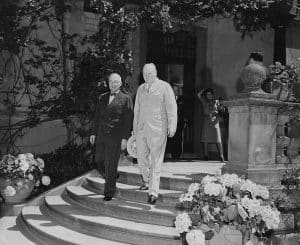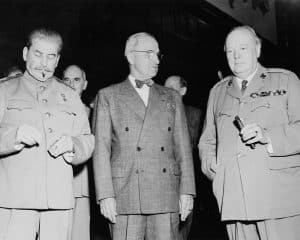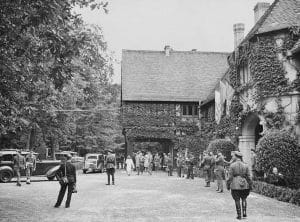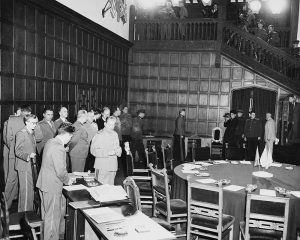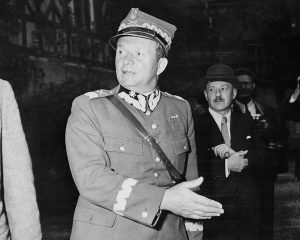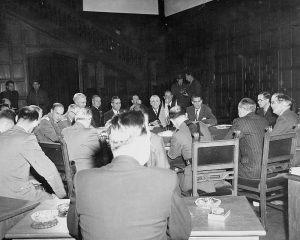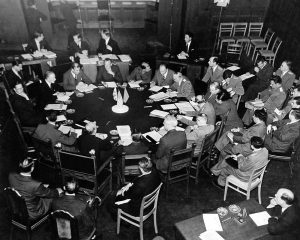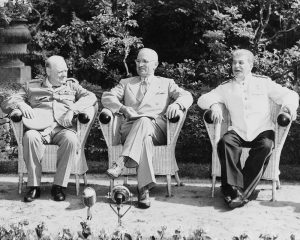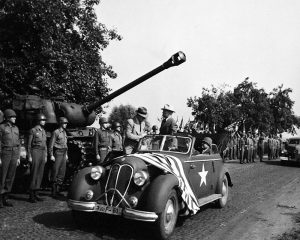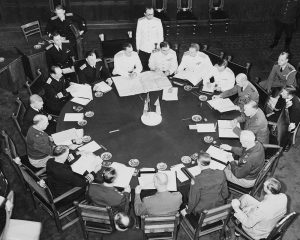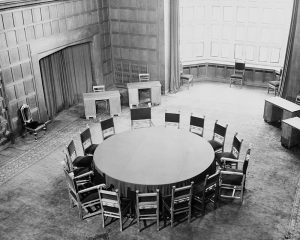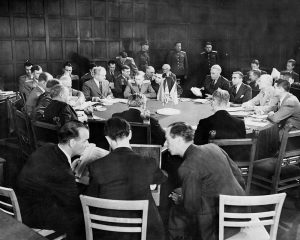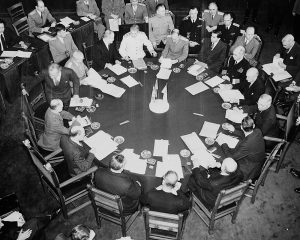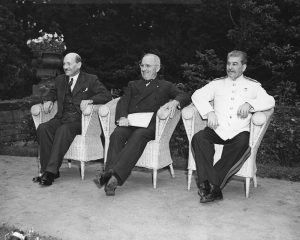Vyacheslav Molotov showed up at the ‘Little White House’ today for a one-on-one meeting with Jimmy Byrnes at 6:00pm. Even before he arrived, the stage was set for high conflict potentially waiting to erupt.
Molotov received a copy of the Potsdam Declaration shortly after it had been released last night. He called up Byrnes right away and requested that it be held up for two or three days, so that he would have a chance to address the conditions. When Molotov was informed that it had actually already been released to the world, he immediately became disturbed and told the Secretary of State that they would discuss the matter in more detail today.
Since the British delegation had not yet returned to Potsdam, Molotov and Byrnes had an opportunity to come together and see if they could possibly make some headway on the negotiations that had proved yield some of the most bitter disagreements thus far: reparations and the future of Germany.
Walter Brown, Byrnes’s assistant wrote in his notes:
“Either Russia’s going to play ball and quit wanting so much or our relations will deteriorate…JFB (Byrnes) and the President have been becoming more exasperated with the Russians every day.”
Molotov and Byrnes sat down with their interpreters V.N. Pavlov and Chip Bohlen. The atmosphere was tense and Molotov was clearly distressed, while Byrnes remained calm.
“Why weren’t the Soviets consulted regarding this ultimatum to Japan?” Molotov immediately lashed out.
“It wasn’t submitted to you before release because we did not want to embarrass the Soviet Union by presenting it with a declaration affecting a country with which it was not yet at war,” Byrnes quietly replied as he stated the obvious.
Molotov paused, let the Secretary of State’s words sink in for a moment and then further expressed his disappointment and dissatisfaction by reiterating the fact that the Soviets should have been consulted first. According to Chip Bohlen, Molotov hinted that a higher authority would be looking into the matter:
“Mr. Molotov replied that he was not authorized to discuss this matter further. He left the implication that Marshal Stalin would revert to it at some point.”
It was not that Molotov would have made significant changes to the declaration or would have added something in particular that the proclamation did not already state; rather, at the end of the day he may have appeared somewhat betrayed through the eyes of Byrnes and his staff, but Molotov was more or less upset because if the Japanese accepted the Potsdam Declaration within the next several hours, the Soviet Union was not at war with Japan and therefore had no say when it came to dividing up the spoils and dealing with the aftermath. Therefore, by requesting that Byrnes postpone the announcement for a few days this would have then bought the Soviets some time to work on their own version of an ultimatum, combine it with the language in the one that was issued, and then try to convince the American, British, and Chinese governments to submit it to Japan together.
But the deed had been and now Stalin was immediately provoked to order Molotov to begin discussing the immediate cause of the Soviet Union’s entry into the war.
“The Soviet Government,” Molotov said, “considers that the best method would be for the United States, Great Britain, and the other Allies to address a formal request to the Soviet Government for its entry into the war….We also assume, of course, that the agreement with the Chinese Government would be signed before we enter the war.”
The United States, particularly Byrnes, saw this request problematic. The Soviet Union had a non-aggression pact with the Japanese. This was something that they also had had with Hitler and Nazi Germany, but it was of course the Nazis who had violated that one. Byrnes felt that the United States Government should not be put in a position of asking another government to violate its agreement without good and sufficient reason.
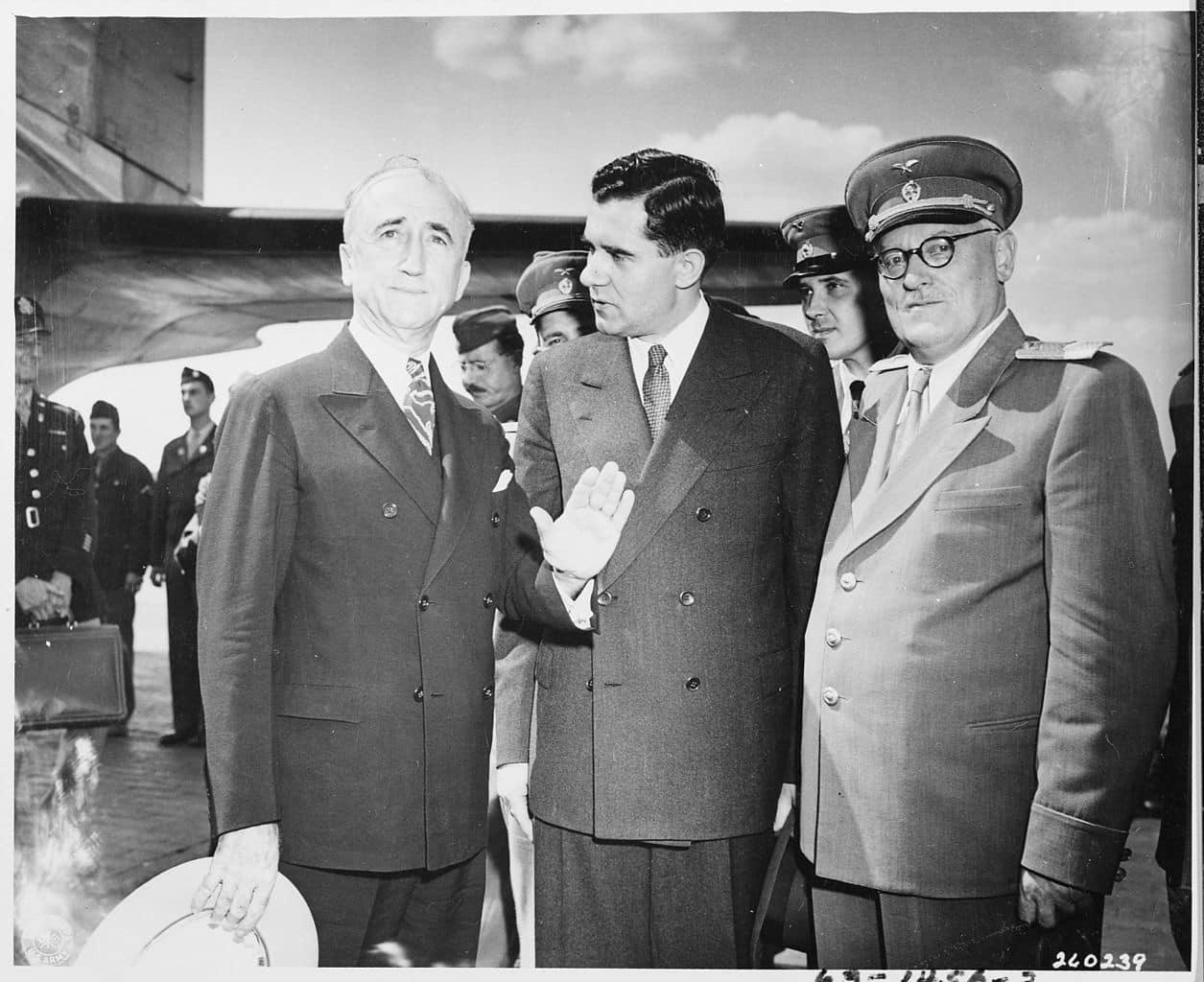
The Soviet Union had notified Japan a few months earlier of its intention to repeal the treaty, but it would still be in force for nearly a year, something that disturbed Truman.
Moreover, the United States was starting to have buyer’s remorse. When the agreement on Russian participation in the war was brought up at Yalta, the military situation had been entirely different. President Roosevelt, along with military leaders, wanted the Soviet Union in the war, especially as they anticipated the amount of casualties that would result from a ground invasion. However, now in view of what the Americans knew about the Soviets’ actions in eastern Germany and the violations of the Yalta agreements in Poland, Romania, and Bulgaria, they were beginning to waver – particularly Byrnes – when it came to Soviet participation in the war with Japan.
“I would have been satisfied had the Russians determined not to enter the war. Notwithstanding Japan’s persistent refusal to surrender unconditionally, I believed the atomic bomb would be successful and would force the Japanese to accept surrender on our terms. I feared what would happen when the Red Army entered Manchuria.”
Byrnes and advisor Ben Cohen spent hours trying to decide how President Truman could properly reply to the Soviet request. It was Cohen who suggested that the Soviet Government’s obligations under the Charter of the United Nations should be used as the immediate cause for entering the war. Byrnes then drafted a letter for the President to approve.
The letter first mentioned the Moscow Declaration of October 30, 1943, signed by the Soviet Union, the United States, the United Kingdom, and China. That declaration provided that:
“…For the purpose of maintaining international peace and security pending the re-establishment of law and order and the inauguration of a system of general security, they will consult with on another and as occasion requires with other members of the United Nations with a view to joint action on behalf of the community of nations.”
The letter then pointed out that Article 106 of the proposed United Nations Charter provided that the four powers would continue to act on the basis of the Moscow Declaration until the Charter came into force. It then cited Article 103 of the Charter, provided that:
“…In the event of a conflict between the obligations of the Members of the United Nations under the present Charter and their obligations under any other international agreement, their obligations under the present Charter shall prevail.”
The President’s letter then concluded:
“Though the Charter has not been formally ratified, at San Francisco, it was agreed to by the Representative of the Union of Soviet Social Republics and the Soviet Government will be one of the permanent members of the Security Council.”
Truman approved the letter and the Soviet Union now had its official justification to enter into the war with Japan. And Stalin got to work immediately to make sure that the Soviets would have a front seat at the bargaining table before it was too late. On July 30 from Potsdam, he appointed Aleksandr Vasilevsky as the Commander-in-Chief of the Soviet Union’s forces in the far east who would eventually direct the start of the Battle of Manchuria just days later.
In hindsight Byrnes was eventually correct in his assessment that the United States would have been better off reneging its desire to have Russia enter into the war with Japan, especially since the plan to drop the atomic bomb was moving inexorably forward. Despite the fact that the initial mood and desire had been to obtain Soviet support in the Pacific, no one on the American side who had aggressively pushed for this support could have anticipated all the difficulties that were encountered after Yalta.
–
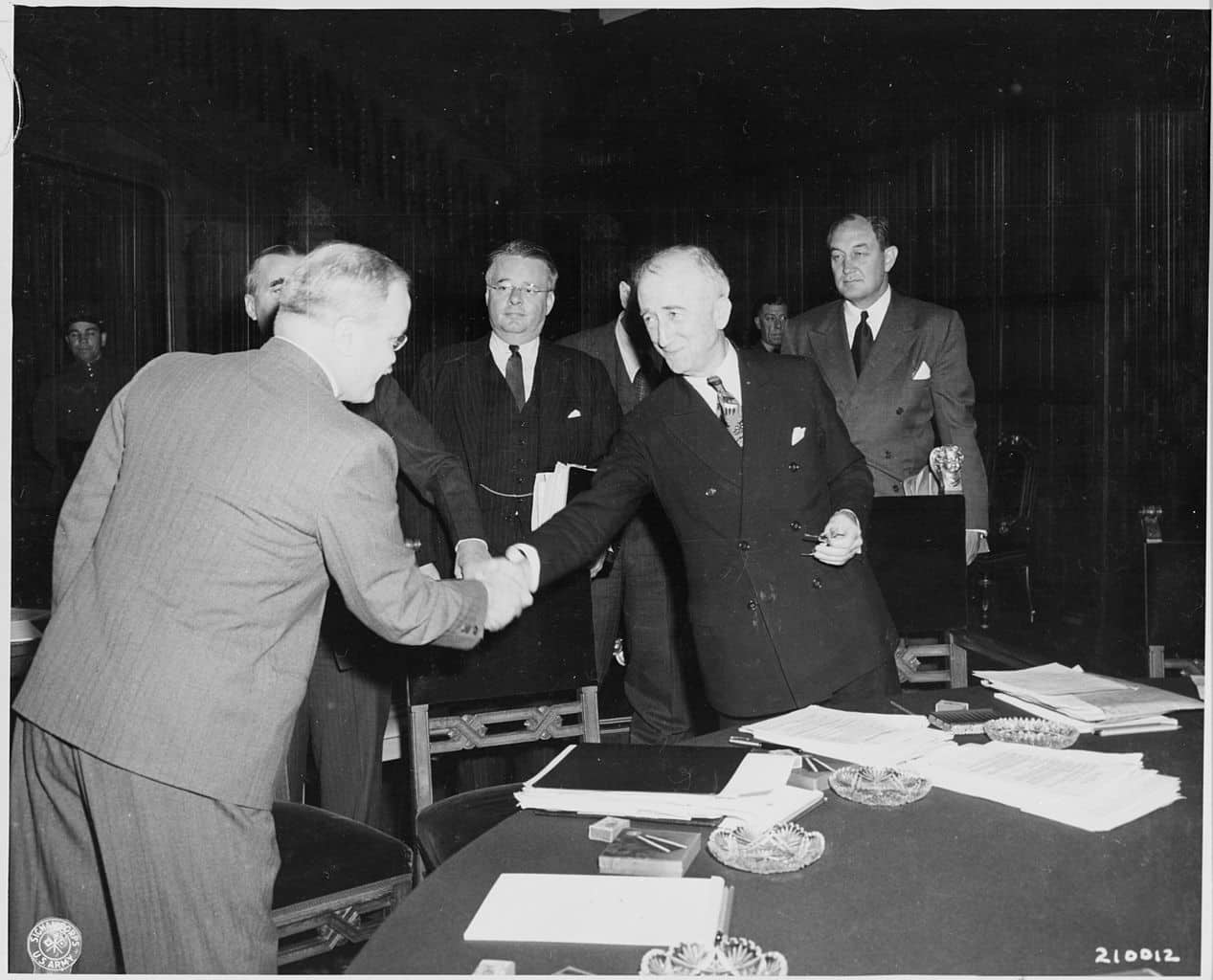
It was now time to talk about reparations and Byrnes and Molotov could not have had more differing viewpoints on this topic than they did.
Justice and precedent demanded that Germany should have to pay for the Allies’ damages. As far as Stalin and Molotov were concerned, the Soviet Union had shed more blood and suffered more death in World War II than any other nation by far, and the Soviets expected to get the lion’s share of reparations in return.
First and foremost, the Russians were adamantly demanding that Germany pay $20 billion in reparations of which half would go to the Soviet Union. This figure was introduced at the Yalta Conference and accepted by Roosevelt not as an agreement, but rather ‘as a basis for discussion’.
Molotov returned to this subject and reiterated this demand with the complaint that the United States was seeking to reverse the decision made at Yalta by not accepting the $20 billion proposal. According to Byrnes, he had quite a task in front of him trying to get Molotov to understand that acceptance by Roosevelt ‘as a basis for discussion’ was not a commitment. He then gave Molotov an analogy that even a child could have understood when he said:
“If you say I owe you a million dollars and I say I will discuss it with you, that does not mean I am going to write you a check for a million dollars.”
“I see,” Molotov replied.
But he didn’t. Byrnes’s analogy wasn’t sinking in; the Soviets wanted to get paid and Molotov aggressively pressed Byrnes to agree to it because he saw the money as crucial to the Soviets’ plans for postwar expansion. Byrnes then later recalled:
“So I pointed out that we not only had accepted the proposal as a basis for discussion but that Mr. Pauley (the United States representative to the Allied Reparations Committee) had been in Moscow for thirty-five days and discussed it; then he had come to Berlin and we had continued to discuss it, and for the many reasons I had previously explained to him we had decided, after this discussion, that the figure was not practical.”
It was not practical for a number of reasons, but the main one being that – something of which he needed to remind Molotov – Germany was in shambles while hundreds of thousands of its citizens were starving and in desperate need of food, water and shelter. Furthermore, if this $20 billion had been agreed to, the only way Germany would have been able to make payments would be through loans from the United States, which would quite likely never be paid back. History would therefore be repeating itself, as this was exactly the mistake that the United States made after WWI, and the American people would simply and surely not have stood for it again.
Moreover, the Americans were wary of the whole reparations issue in general, especially since there was now ample evidence by this point that the Soviets had been looting territories that the Red Army had liberated or currently occupied – particularly in Germany.
After returning from Moscow, Representative Pauley, whom President Truman had appointed, had been touring Germany and observing the Soviets on a mission throughout their zone. He would write:
“Red Army men packing woodworking machines, bakery ovens, textile looms, electric generators, transformers, telephone equipment – countless items, most of which could not be considered war potential, and assuredly not war booty. Yet there they were, moving before my eyes, on their way to the Soviet Union.”
Less than one week before today’s meeting between Byrnes and Molotov, two of Pauley’s men had witnessed loading platforms in railroad stations in Berlin where as they would report:
“…swarms of workmen, mostly men in Russian Army uniforms, were moving boxes, crates, sacs, bales, drums, boilers, partially-covered machine tools and large pieces of machinery onto trains bound for the Soviet Union. Electrical equipment, stamping mills, wood-working machinery, printing presses…”
In other words, the Soviets had already begun paying themselves at Germany’s expense.
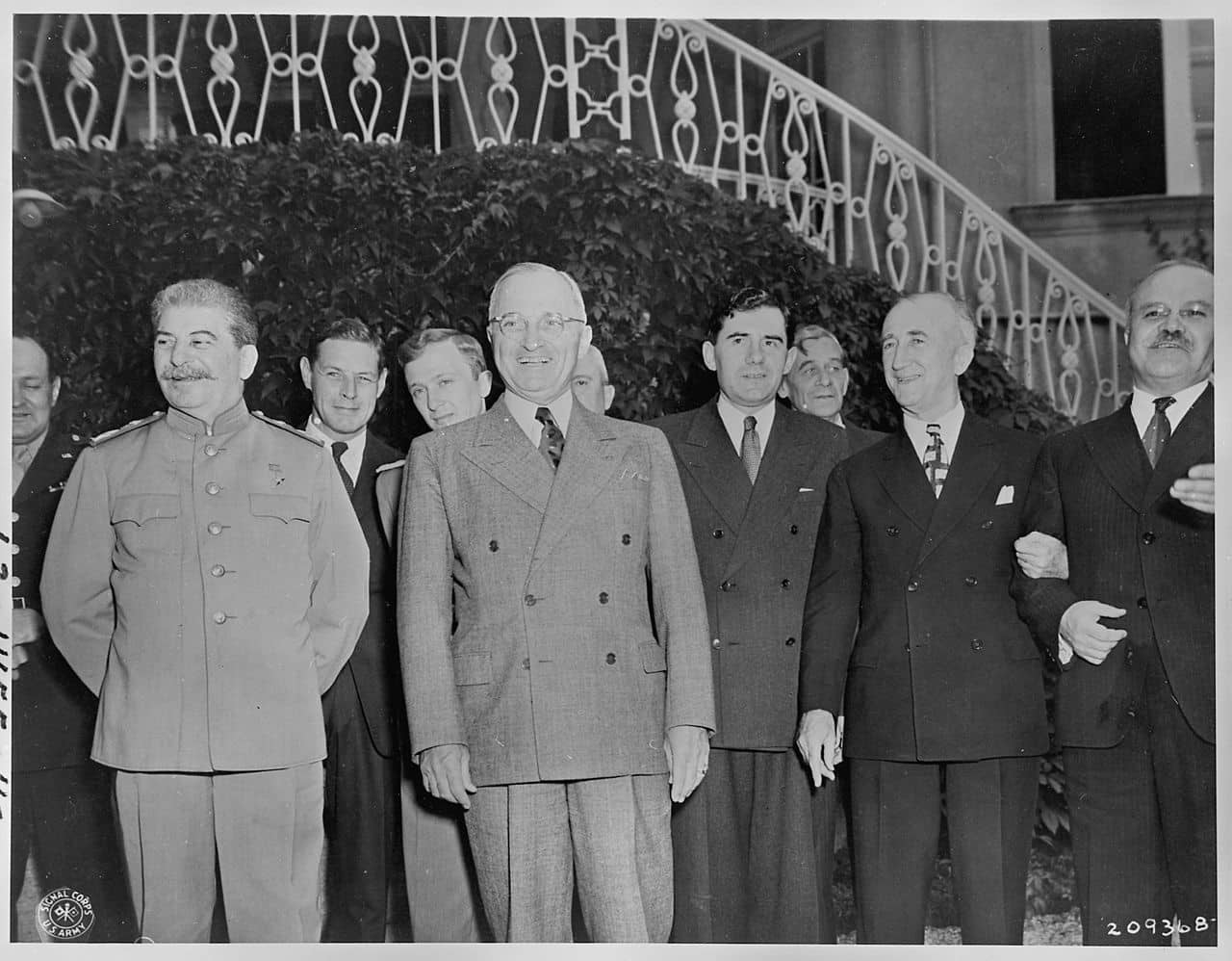
When Byrnes asked Molotov if the Soviet authorities were removing German equipment and materials, even household goods, for transport to the USSR, Molotov did not deny it. “Yes,” he said. “This is the case.”
So Byrnes came up with something else and suggested a plan that took the Soviets’ looting a step further – that was, suggesting the idea that all four occupying powers could take what they liked from their own occupation zones:
“…namely, that each country would obtain its reparations from its own zone of occupation and would exchange goods between the zones,” Byrnes said.
Molotov immediately wanted clarification:
“Does this mean that each of the four occupying powers would have a free hand in their own zones to extract reparations and would act entirely independently of the others?”
According to the meeting minutes:
“The Secretary said that was true in substance but he had in mind working out arrangements for the exchange of needed products between the zones.”
The Russian zone grew the most food but had less industry; the British zone had the most manufacturing but would need to import food. The economic complexities would require trade, and meanwhile, each occupying nation could extract reparations from its own zone.
In short, Byrnes’ plan was an attempt to create a mechanism for a peaceful occupied Germany that would eventually reunify. It sought to avoid future conflict between the Anglo-Americans and the Russians, and thus the dividing of Germany between an ‘east’ and a ‘west’.
Molotov, however, refused to let the $20 billion figure go and kept pointing to the fact – despite Byrnes’s “If you say I owe you a million dollars” analogy – that the Americans were breaking the promise they had made at Yalta. The meeting ended where it had started, with no agreement, and the hope for a lasting peace in an economically viable, united Germany was beginning to slip away.
–
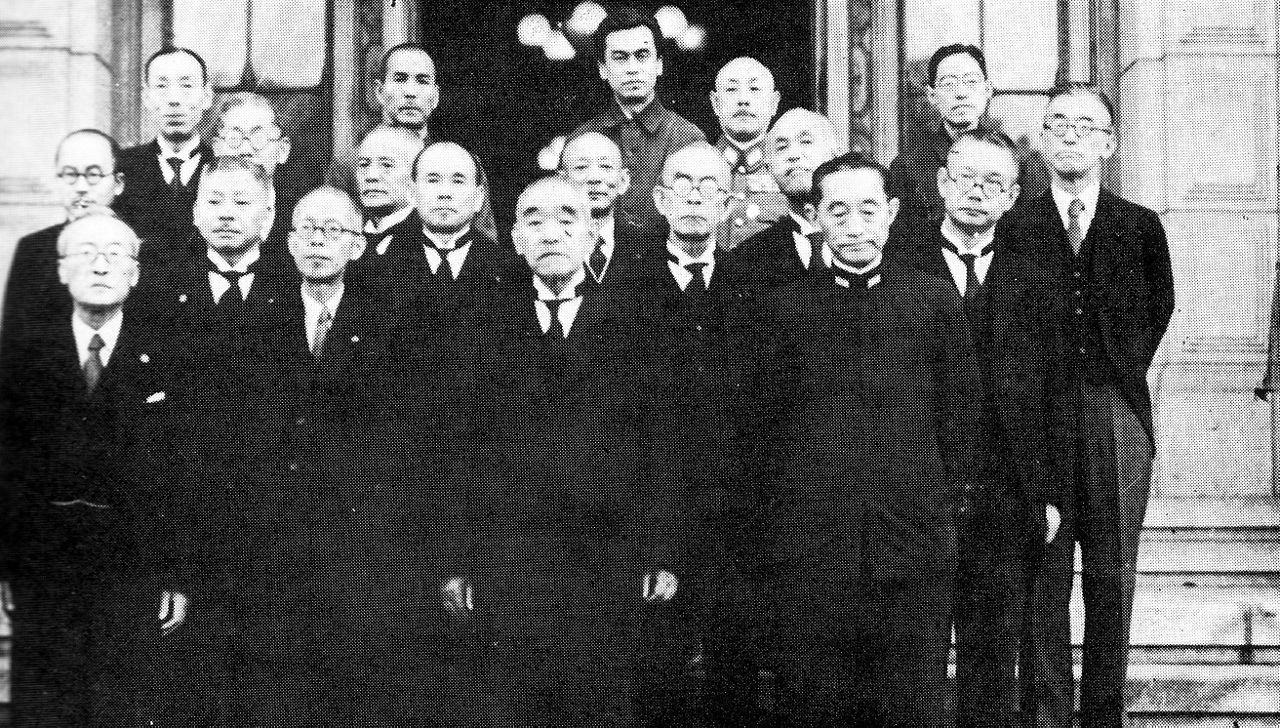
Meanwhile in Tokyo, Prime Minister Kantaro Suzuki and his cabinet had met during the morning to discuss the release of the Potsdam Declaration. Japanese radio monitors picked it up at 6:00am Tokyo time and soon thereafter, American planes were dropping millions of leaflets with the printed translation of the declaration.
Phrased as a joint statement by Attlee, Generalissimo Chiang Kai-shek, and Truman, the Potsdam Declaration assured the Japanese people humane treatment. They would not be “enslaved as a race or destroyed as a nation.” Once freedom of speech and religion were established, once Japan’s warmaking power had been eliminated and a responsible, “peacefully inclined” government freely elected, occupation forces would be withdrawn.
The words “unconditional surrender” appeared only once, in the final paragraph, and then specified that it only demanded the ‘unconditional surrender’ of the armed forces, not the Japanese nation. The alternative was “prompt and utter destruction.” And the fate of Emperor Hirohito was left ambiguous. He was not mentioned, nor was there any explanation of what ‘prompt and utter destruction’ really meant and in what form it would come.
After a full-day’s meeting, Suzuki decided to simply ignore the matter. At a press conference following his Cabinet’s talks he said:
“The Declaration is nothing but a rehash of old proposals and as such, beneath contempt. I will kill it with silence.”
**
Our Related Tours
To learn more about Potsdam and visit the site of the Potsdam Conference, have a look at our Glory Of Prussia tours.
To learn more about the history of Cold War Berlin and life behind the Iron Curtain; have a look at our Republic Of Fear tours.
Bibliography
Byrnes, James (1947). Speaking Frankly. New York: Harper & Brothers. ISBN 978-0-837-17480-8
Cullough, David (1992). Truman. New York: Simon & Schuster. ISBN 978-0-671-86920-5
Fabian, Nadine. “Ein Besuch in der Stalin-Villa in Potsdam.” Märkische Allgemeine. 23 August 2017, https://www.maz-online.de/Lokales/Potsdam/Ein-Besuch-in-der-Stalin-Villa-in-Potsdam
Neiberg, Michael (2015). Potsdam: The End of World War II and the Remaking of Europe. New York: Basic Books. ISBN 978-0-465-07525-6
McBaime, Albert (2017). The Accidental President. New York: Houghton Mifflin Harcourt. ISBN 978-0-544-61734-6
Miscamble, Wilson D (1978). Anthony Eden and the Truman-Molotov Conversations, April 1945
Roberts, Geoffrey (2007). Stalin at the Tehran, Yalta, and Potsdam Conferences
Smyser, William (1999). From Yalta To Berlin: The Cold War Struggle Over Germany. New York: St. Martin’s Press. ISBN 0-312-06605-8
Sternberg, Jan. “Churchill und die lila Plüschmöbel.” Märkische Allgemeine. 13 July 2015, https://www.maz-online.de/Thema/Specials/P/Potsdamer-Konferenz/Villa-Urbig-am-Griebnitzsee.
Truman, Harry S. (1956). Memoirs: Year of Decisions Volume 1. New York: Doubleday.




